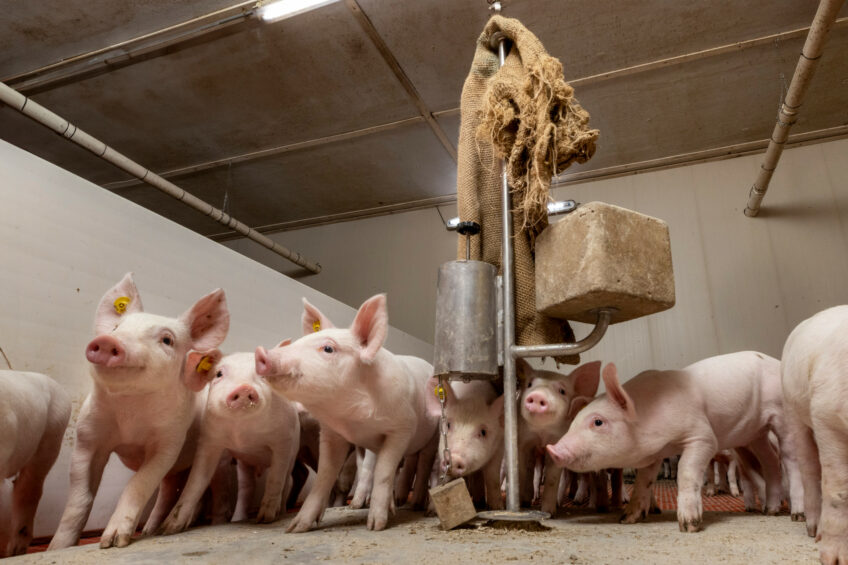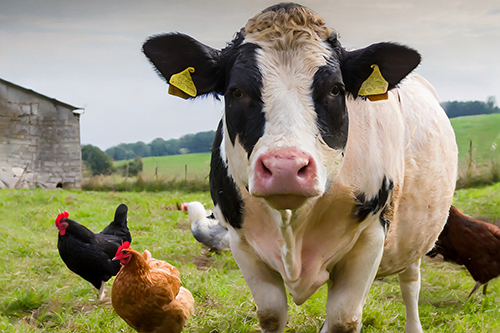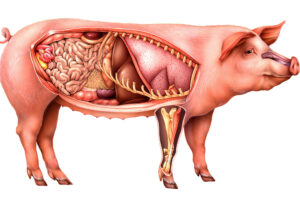Probiotics in pig feed: What are the benefits?

Probiotics, when administered in adequate amounts, improve gut microbiota, and confer a good health benefit on the host. This article will discuss the impact of commercial probiotic products used in pigs’ diet.
Commercial probiotics are usually isolated from the gut microflora of the pigs and selected based on resistance to stomach acids and bile salts, ability to colonise the intestine or antagonise potentially pathogenic microorganisms. The most used bacteria include Bacillus, Lactobacillus, Bifidobacterium, Enterococcus, Pediococcus, and Streptococcus.

Probiotics mechanism of action
Various probiotics improve pig health by modifying gut microbiota, regulating host immune responses, reducing diarrhoea and antitoxin effects, modulating nutrient digestibility, antioxidant activity and suppressing virulent gene expression.
Modifying gut microbiota
Probiotics regulates gut microbiota and prevent imbalance, thus repairing the deficiencies of benign gut microorganisms, improving nutrient digestion and absorption, and restoring resistance to diseases.
Probiotics also increase the relative abundance of beneficial bacteria such as Lactobacillus and decrease the relative abundance of harmful bacteria such as Clostridium, E. coli, and Enterobacterium spp. in swine gut.
Dietary supplementation with Saccharomyces boulardii and Pediococcus acidilactici reduces E. coli levels in the weaned pigs. Feeding sows with Enterococcus faecium reduces the counts of E. coli and Clostridium perfringens in the faeces. In addition, Lactobacillus ferments carbohydrates to produce short chain fatty acids such as lactic and acetic acids and decrease gut pH to a level that harmful bacteria cannot tolerate.
Therewith, probiotics produce antioxidants, and antimicrobial peptides which reduce the number of viable pathogenic organisms, bacterial metabolism, and toxin production.
Regulating host immune responses
Probiotics support host immune systems through both innate immune responses and acquired immune responses. The gut tract contains benign and harmful microorganisms, nutrients, toxic materials, and some foreign antigens. Epithelial cells in the gut tract create a barrier as the first line of defence against harmful microbes in the gut tract. Probiotics restitute the gut barrier function disrupted by stress or disease conditions. In addition, probiotics affect gut cellular stability by increasing gut barrier function and modulating tight junction proteins.
Example of various probiotics and their beneficial impact on the immune system:
- Lactobacillus acidophilus and Lactobacillus rhamnosus reduce mucin secretion response induced by porcine rotavirus. Furthermore, Lactobacillus acidophilus treatment prior to the virus infection increases immune response to the infection.
- Lactobacillus plantarum protects gut cells against epithelial barrier damage caused by E. coli.
- A mixture of Enterococcus faecium and Lactobacillus casei enhance the interleukin concentration in the ileal tissue of pigs, indicating an increased gut local immunity.
- Supplementing Bifidobacterium longum increases the total amount of gut mucosal IgA.
- Feeding Lactobacillus fermentum to piglets increases the proinflammatory cytokines and the percentage of lymphocyte subset in the blood.
- Lactobacillus casei has immunoadjuvant activity through increasing gut IgA level.
- Supplementing Bacillus cereus increases lymphocytes and T cells in the post-weaning piglets.
- Dietary Enterococcus faecium supplementation increases the production of specific antibodies against Salmonella.

Reducing diarrhoea and antitoxin effects
It is shown that administration of Enterococcus faecium reduces the rate of post-weaning diarrhoea and the overall pre-weaning mortality. Addition of Bacillus subtilis, Saccharomyces boulardii, Enterococcus faecium, Lactobacillus acidophilus, Pediococcus pentosaceus, and Lactobacillus fermentum decreases the incidence of diarrhoea. Furthermore, feeding microencapsulated Enterococcus faecalis decreases the incidences of diarrhoea in the weaned piglets.
Modulating nutrient digestibility
Probiotics improve the digestibility of dry matter, organic matter, energy, crude protein, crude fibre, and phosphorus.
- Dietary supplementation of Lactobacilli complex increases the apparent digestibility of crude protein and phosphorus in weaned pigs fed a corn and soybean meal-based diet.
- Lactobacillus fermentum, Bacillus subtilis, and Clostridium butyricum endospores improve crude protein and energy digestibility.
- Limosilactobacillus reuteri and Lactiplantibacillus plantarum complex improve apparent total tract digestibility of nitrogen and energy.
- Enterococcus faecium, Lactobacillus acidophilus, and Lactiplantibacillus plantarum increase the apparent ileal digestibility of organic matter, crude protein, and crude fibre, and the apparent total tract digestibility of crude protein and crude fibre post-weaning.
- A mixture of Bacillus subtilis, Saccharomyces boulardii, Enterococcus faecium, Lactobacillus acidophilus, Pediococcus pentosaceus, and Lactobacillus fermentum improves organic matter and crude protein digestibility and the activity of enzymes such as sucrase, lactase and tripeptidase.
- Bacillus amyloliquefaciens affects the absorption and secretion activities of swine gut cells.
Antioxidant activity and suppressing virulent gene expression
Bifidobacterium longum produces antioxidants, scavenges free radicals, thus decreasing oxidative stress of pigs. Lactobacillus fermentum supplementation improves the antioxidative defence system and enhances the performance of weanling and growing-finishing pigs. Adding lactobacillus acidophilus to pigs’ diet suppresses the expression of virulence gene of E. coli thus preventing the colonization of this bacterium in host gut tract.











